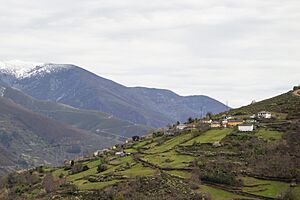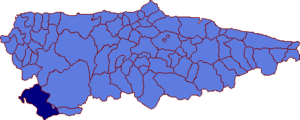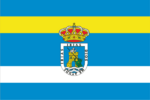Ibias facts for kids
Quick facts for kids
Ibias
|
|||
|---|---|---|---|

Parish of San Clemente, Ibias
|
|||
|
|||
 |
|||
| Country | |||
| Autonomous community | |||
| Province | Asturias | ||
| Comarca | Narcea | ||
| Judicial district | Cangas de Narcea | ||
| Capital | San Antolín de Ibias | ||
| Area | |||
| • Total | 333.30 km2 (128.69 sq mi) | ||
| Highest elevation | 1,961 m (6,434 ft) | ||
| Population
(2023)
|
|||
| • Total | 1,121 | ||
| • Density | 3.3633/km2 (8.711/sq mi) | ||
| Demonym(s) | ibiense | ||
| Time zone | UTC+1 (CET) | ||
| • Summer (DST) | UTC+2 (CEST) | ||
| Postal code |
33810
|
||
| Official language(s) | Spanish | ||
Ibias is a small municipality located in Asturias, a region in northern Spain. It's home to about 1,121 people as of 2023. The municipality shares its name with the Ibias river, which flows right through it.
The main town and largest area in Ibias is San Antolín. Besides San Antolín, Ibias is also made up of several other smaller areas called parishes, like Cecos, Marentes, and Tormaleo. Ibias is found in the middle part of the Cantabrian Mountains, a large mountain range. A section of the beautiful Fuentes del Narcea, Degaña e Ibias Natural Park is also located within Ibias.
Contents
History of Ibias
Early Records and Disputes
The first times Ibias was mentioned in writing were in the 1000s. Back then, it was called "Ibi" or "Ibia." Later, in the 1300s, there was a big disagreement between the powerful family that ruled Ibias and the local people. The people wanted their rights to be recognized, and the dispute was eventually settled in favor of the ruling family.
Changes in Territory
A few centuries later, the ruling family faced many complaints because they were misusing their power. Because of this, a lot of their land was taken away, and Ibias became smaller. In 1836, another area called Degaña decided to become its own separate municipality, making Ibias even smaller.
Skilled Woodworkers: Torneiros
Historically, Ibias was also famous for its torneiros. These were very skilled craftspeople who made and sold beautiful wooden tools and items all over Spain.
Ibias in Modern Times
Coal Mining and Population Changes
In the 1900s, something big happened in Ibias. Coal was discovered near Tormaleo, one of its parishes. This led to a huge boom in coal mining, and the parish of San Antolín grew a lot, becoming the most populated area in the municipality. The coal industry became the main way people earned a living.
Decline and New Beginnings
However, since the mid-1900s, many of the coal mines in Ibias have closed down. This caused a big population decline as many people moved away to find work in bigger cities. To help Ibias recover, the Ministry of Environment has started projects to boost the local economy. These projects focus on promoting ecotourism, which means encouraging visitors to enjoy nature and support local businesses in a sustainable way.
See also
 In Spanish: Ibias para niños
In Spanish: Ibias para niños
 | Roy Wilkins |
 | John Lewis |
 | Linda Carol Brown |




